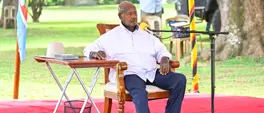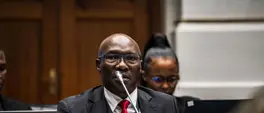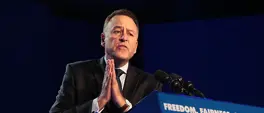JAMIL F. KHAN | Speaking ill of the dead: Why honesty matters more than protecting harmful legacies
Jamil F. Khan
17 September 2025 | 11:17"The recent murder of American right-wing hate influencer, Charlie Kirk, has inspired an ominous point of division across the world on the appropriateness of telling the truth about his life."

A photo Charlie Kirk is seen at his makeshift memorial at Orem City Center Park in Orem, Utah, a day after he was shot during a public event at Utah Valley University on 11 September 2025. Picture: AFP
In almost every culture on earth, some iteration of the golden rule of social relations is observed through collective agreement that “you do not speak ill of the dead”.
This social convention is meant to accord a certain respect to not only the deceased, but also the gravity of death.
The event of death fascinates human beings endlessly because of how unknowable it is. Yet, in indigenous cultures, so much of our knowledge about life comes from our attempts to understand death.
This statement is also a protection of the deceased who can no longer defend themselves against criticism.
Such a principle, however, has been manipulated for almost as long as it has existed, to shield people’s legacies from the truth – another expression of a post-truth world.
While also living in a time where words are used to manipulate our perception of reality, we are being told that the live-streamed intentional, daily mass killing of people in Palestine does not constitute evidence of a genocide, while genocides in Congo and Sudan do not even make it into the discussion. The power of words does indeed shape our world.
The recent murder of American right-wing hate influencer, Charlie Kirk, has inspired an ominous point of division across the world on the appropriateness of telling the truth about his life.
For supporters of Kirk, his legacy is clearly one of bravery in the pursuit of freedom of expression which is perceived as virtuous and valiant, in the face of extreme censorship by the “threat” of radical leftism, which is portrayed to be a murderous crusade against conservative values.
These values, admittedly, aim to restore a world order which endorses racism, sexism, queerphobia, ableism and other colonial values, while denying its effects.
Those who do not claim to be supporters, but somehow found value in his ideas, have insisted that in spite of the harm he caused while alive, those who refuse to mourn him and/or openly celebrate his death, constitute a different form of evil.
Within this broad stroke accusation, opportunities for dissecting the harm of his actions and being honest are shut down. Because we don’t speak ill of the dead, through word or deed, those who refuse the performance of mourning have their humanity questioned in a way that suggests honesty is cruelty.
For many, this murder is horrific because he was “killed over some words”. This assertion completely diminishes the power of language as a tool of violence that does not only describe the world, but constructs it.
Located within a rising tide of authoritarianism rooted in a supremacist ideology that seeks to stifle human rights progress for marginalised groups, and repeal protections for them.
A familiar world, now spoken about in the past tense, is unashamedly being resurrected with demands, which are quickly turning violent words into violent actions. It also inspires cross-continental bigotries to flourish.
The hostility of the US government and other governments globally towards queer people, particularly transgender women, is also inspiring more brazen displays of homophobia here at home.
According to a MambaOnline article, a Pride flag mural was recently defaced with a homophobic slur at North-West University in Potchefstroom, leaving LGBTIQ+ students shaken.
The words: “F*ck the f*gs” were paintedin white, and signed off with what is assumed to be the initials RH. In committing an act of hate speech under the South African constitution, this person felt emboldened to leave an identifier, in a brazen provocation that shows no fear for consequence.
This rejection of our constitutional values and disregard for consequences shows how conservative pushback against human rights progress is spreading through the dehumanising discourses championed by a resurging white male supremacism that claims to amount to nothing more than words.
I have previously written about the way Donald Trump’s presidency has normalised a systemic rejection of the truth. This is not the first time in history that the destruction of the truth has been a political objective of a government administration.
In apartheid South Africa, in Nazi Germany, in segregated America, truth was the most hated enemy of the state. As we can see across societies in this current moment, this rejection of truth has material consequences.
The impression, being created by this social climate, that people’s humanity and subsequently their existence can be debated, leads us to a dangerous place. This is a place created with words.
The world is currently facing the fallout of an enduring ideological battle that many naively thought was settled after World War II.
battle is finding expression in extreme and grotesque ways which, through spectacle, overshadows how ideology is being made and remade through words.
When we use death as a muzzle for the truth, denying Black people, women, queer people, disabled people and other marginalised groups the right of reply to their daily dehumanisation, we admit that we value the feelings of those who perpetuate hate over the humanity of their victims.
Though we are bound by various social codes meant to honour collective humanity, we must not allow manipulation of those values to silence our resistance.
The benefits of community and co-existence are earned through our participation in humane practices that reject harm.
We are always faced with a choice of who to be and for many, like Charlie Kirk, a full and proud awareness of the legacy they are leaving prevails while alive. For people to remember them in the full light of the harm they caused is, in fact, an honour to those legacies.
Our own discomfort with the truth might prompt us to rebrand this honesty as inappropriate, but for people who suffer so relentlessly under the effects of social violence, being told how to express their feelings about the passing of their oppressors signals another kind of violence.
Though our shared humanity should bind us to each other, those who choose to break that bond do not have legitimate claim to the protections of our human values and should be remembered for the outcomes of their choices and how they accounted for or reinforced those choices and the harm they caused.
Jamil F. Khan is an award-winning author, doctoral critical diversity scholar, and research fellow at the Johannesburg Institute for Advanced Study.
Get the whole picture 💡
Take a look at the topic timeline for all related articles.
















